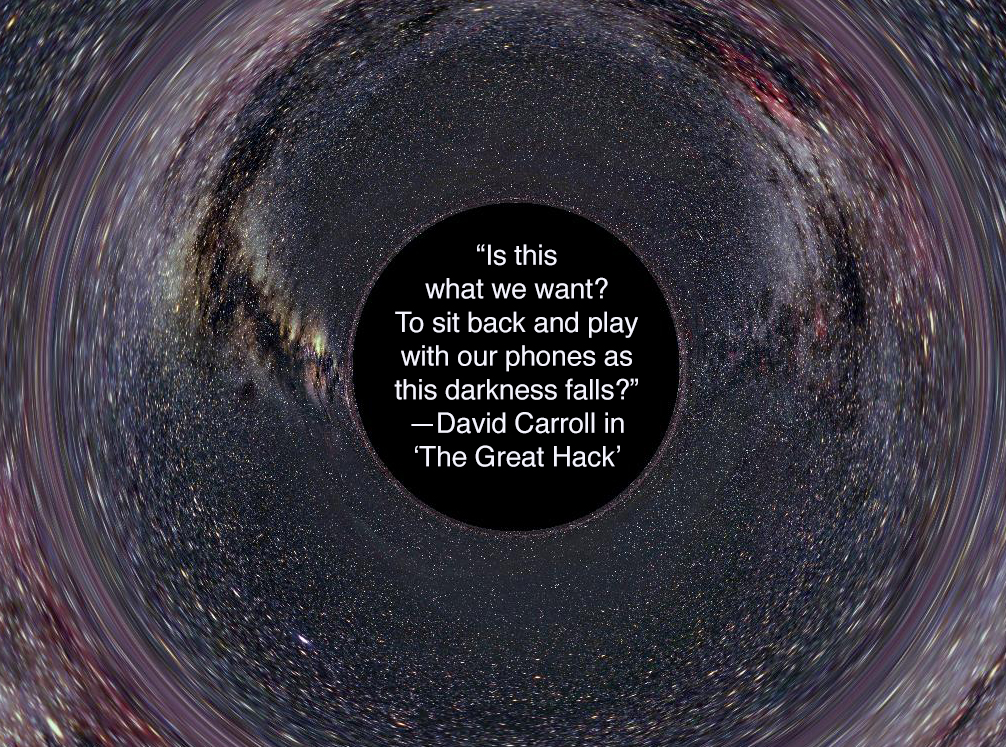
Last night I watched The Great Hack a second time. It’s a fine documentary, maybe even a classic. (A classic in literature, I learned on this Radio Open Source podcast, is a work that “can only be re-read.” If that’s so, then perhaps a classic movie is one that can only be re-watched.*)
The movie’s message could hardly be more loud and clear: vast amounts of private information about each of us is gathered constantly in the digital world, and is being weaponized so our minds and lives can be hacked by others for commercial or political gain. Or both. The movie’s star, Professor David Carroll of the New School (@profcarroll), has been delivering that message for many years, as have many others, including myself.
But to what effect?
Sure, we have policy moves such as the GDPR, the main achievement of which (so far) has been to cause every website to put confusing and (in most cases) insincere cookie notices on their index pages, meant (again, in most cases) to coerce “consent” (which really isn’t) to exactly the unwanted tracking the regulation was meant to stop.
Those don’t count.
Ennui does. Apathy does.
On seeing The Great Hack that second time, I had exactly the same feeling my wife had on seeing it for her first: that the very act of explaining the problem also trivialized it. In other words, the movie worsened the very problem it solved. And it isn’t alone at this, because so has everything everybody has said, written or reported about it. Or so it sometimes seems. At least to me.
Okay, so: if I’m right about that, why might it be?
One reason is that there’s no story. See, every story requires three elements: character (or characters), problem (or problems), and movement toward resolution. (Find a more complete explanation here.) In this case, the third element—movement toward resolution—is absent. Worse, there’s almost no hope. “The Great Hack” concludes with a depressing summary that tends to leave one feeling deeply screwed, especially since the only victories in the movie are over the late Cambridge Analytica; and those victories were mostly within policy circles we know will either do nothing or give us new laws that protect yesterday from last Thursday… and then last another hundred years.
The bigger reason is that we are now in a media environment summarized by Marshall McLuhan in his book The Medium is the Massage: “every new medium works us over completely.” Our new medium is the Internet, which is a non-place absent of distance and gravity. The only institutions holding up there are ones clearly anchored in the physical world. Health care and law enforcement, for example. Others dealing in non-material goods, such as information and ideas, aren’t doing as well.
Journalism, for example. Worse, on the Internet it’s easy for everyone to traffic in thoughts and opinions, as well as in solid information. So now the world of thoughts and ideas, which preponderate on social media such as Twitter, Facebook and Instagram, are vast floods of everything from everybody. In the midst of all that, the news cycle, which used to be daily, now lasts about as long as a fart. Calling it all too much is a near-absolute understatement.
But David Carroll is right. Darkness is falling. I just wish all the light we keep trying to shed would do a better job of helping us all see that.
_________
*For those who buy that notion, I commend The Rewatchables, a great podcast from The Ringer.
Leave a Reply